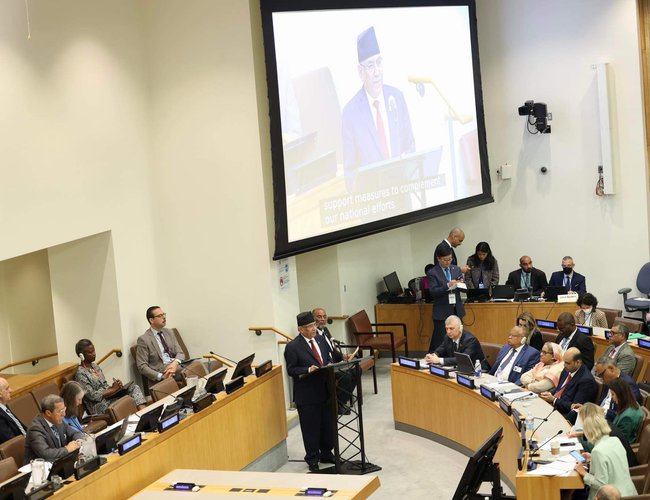
Interestingly, the 16thPlan (2024/25-2028/29) concept note does not consider much talked words - temperature rise, snow-melting, climate change and its impacts on vulnerable communities. The concept note was approved by the National Planning Commission, chaired by the Rt. Hon'ble Prime Minister on02 August 2023. The concept note considers long-term vision (BS 2100), upgrading Nepal to developing country by 2026, and 2030 agenda for sustainable development. It outlines key issues and challenges, five-year vision and objectives, and strategies for structural transformation in 12 themes, including conservation of environment & biodiversity and disaster management & sustainable development. The Plan intends to avoid or minimize development-induced environmental impacts, promote sustainable and green economy, minimize & manage natural and human-induced disasters, convert traditional and fossil fuel-based machine, equipment and vehicles into clean energy-based ones, and conserve and manage sustainably the forests, clean water, and fertile land. It promotes to environment-friendly and quality infrastructure.
Based on the preliminary content, the Plan will likely include existing scenario, major issues & challenges, transformational strategies, major interventions and five-year quantitative targets for specified themes, including SDGs and green economy. Though the preliminary content is subject to change, the transformational strategies on environment, biodiversity, disaster management and sustainable development is expected under the SDG and green economy. National priority is accorded to climate change adaptation and global funding support is channeled through climate change agenda. However, the 16th Plan concept note is non-responsive to climate change and its impacts.
To remind national policymaking and planning authority to adopt climate-friendly and low carbon economic development pathway, recent national priorities and international commitments on climate change are summarized below to continue climate change a cross-cutting priority policy for Nepal's socio-economic and infrastructure development:
a.With an objective of reducing adverse impacts of climate change, the 15th Plan (2019/20-2023/24) targets to prepare and implement local adaptation plans and maintain a balance between physical development and natural environment.
b. The concept note of the BS 2100 long-term vision has set national goals on prosperity and environment with consideration of pollution free and clean environment, biodiversity conservation and environmental balance, climate change adaptation, and natural disaster resilient society as indicators. It has adopted a national strategy on; inter alia, natural resource conservation, disaster and climate change resilience and livelihood promotion. It provides necessary space for climate change adaptation, mitigation, and resilience.
c. Nepal's second Nationally Determined Contribution (NDC, 2020) has targets to reduce greenhouse gas (GHG) emissions by generating and utilizing clean energy, promoting e-vehicles, treating wastewaters, and managing forests. It also targets to prepare and implement local adaptation plans in all 753 local levels. The government has approved the NDC Implementation Plan on 01 August 2023 to meet its commitments on adaptation and GHGs emission reductions. Furthermore, the government has approved the National Adaptation Plan (2021-2050) to reduce climate vulnerability and build resilience by implementing medium- and long-term adaptation actions, including National Framework on Loss and Damage in late 2021.
d. Nepal has declared its commitment for net-zero GHG emissions by 2045on 01 November 2021 at Glasgow, UK., Prime Minister Puspa Kamal Dahal at the 78th session of the UN General Assembly on 21 September 2023, High-Level Dialogue on Financing for Development 2023, and Climate Ambition Summit (2023) in his capacity as the chair of the Group of LDCs at New York on20 September 2023reiterated National ambitious target of net-zero emission by 2045, urged for 'easy access to climate finance for low carbon and climate resilient development pathways, also urged development partners to meet their ODA commitments, and realize the target of 0.2 percent of GNI as ODA to LDCs. The Prime Minister called for 'early operationalisation of the Loss and Damage Fund' with 'simple and easy access procedures for the LDCs', fulfilling target of the US $ 100 billion climate finance commitment of the developed countries, replenishing Green Climate Fund (GCF) and doubling up of the adaptation finance by 2025'. Reminding Nepal 'unfairly suffered from climate crisis', the Prime Minister asked for addressing climate change impacts through a 'compensation mechanism', may be by considering 'polluter pays principle'. It seems non-consideration of 'compensation complexities' in the multilateral processes.
e. Nepal has joined the UN's 'Adaptation Pipeline Accelerator and Early Warnings Initiatives' and called for ensuring Climate Summit and CoP28 (28th session of the Conference of the Parties) to the UN Framework Convention on Climate Change at the United Arab Emirates in November 2023 a 'true turning points to fight against climate crisis'.
f. Nepal is preparing to attend the CoP28 in a meaningful manner. Recently organized workshops on loss and damage and a preparatory meeting on CoP28 signify continuation of pre-CoP consultations on national priorities and concerns on climate change.
Nepal's climate vulnerability has imposed threats to human beings, livelihoods and natural resources. Increased climate-induced disasters have claimed lives, destroyed properties with loss of billions of Rupees, particularly in water infrastructures, and made people's livelihood difficult each year,
Nepal's recent initiatives on climate change, including enhanced understanding at political level in forms climate change a political agenda also at the national level. Climate change has become a part of political speech but unfortunately the forthcoming 16th Plan forgot to respond the effects and risks of two words, the climate change. Let us hope that the detail 16th Plan which is expected to be approved by the Council of Minister in mid-February 2024 will provide necessary space to respond this national and global agenda in a more meaningful way.

Batu Uprety
Former Joint-Secretary and Chief of Climate Change Management Division, Ministry of Environment (then), and former Team Leader, National Adaptation Plan (NAP) formulation process. E-mail: upretybk@gmail.com
- Sagarmatha Sambad: Likely Bearing the Fruits
- Mar 27, 2025
- Decadal Experience In Preparing The NDC
- Mar 03, 2025
- Over Five Decades Of Concern On Air Pollution
- Jan 16, 2025
- Damaging The Functional EIA Track
- Dec 22, 2024
- Baku CoP29 Outcomes And Nepal's Initiatives
- Nov 26, 2024













